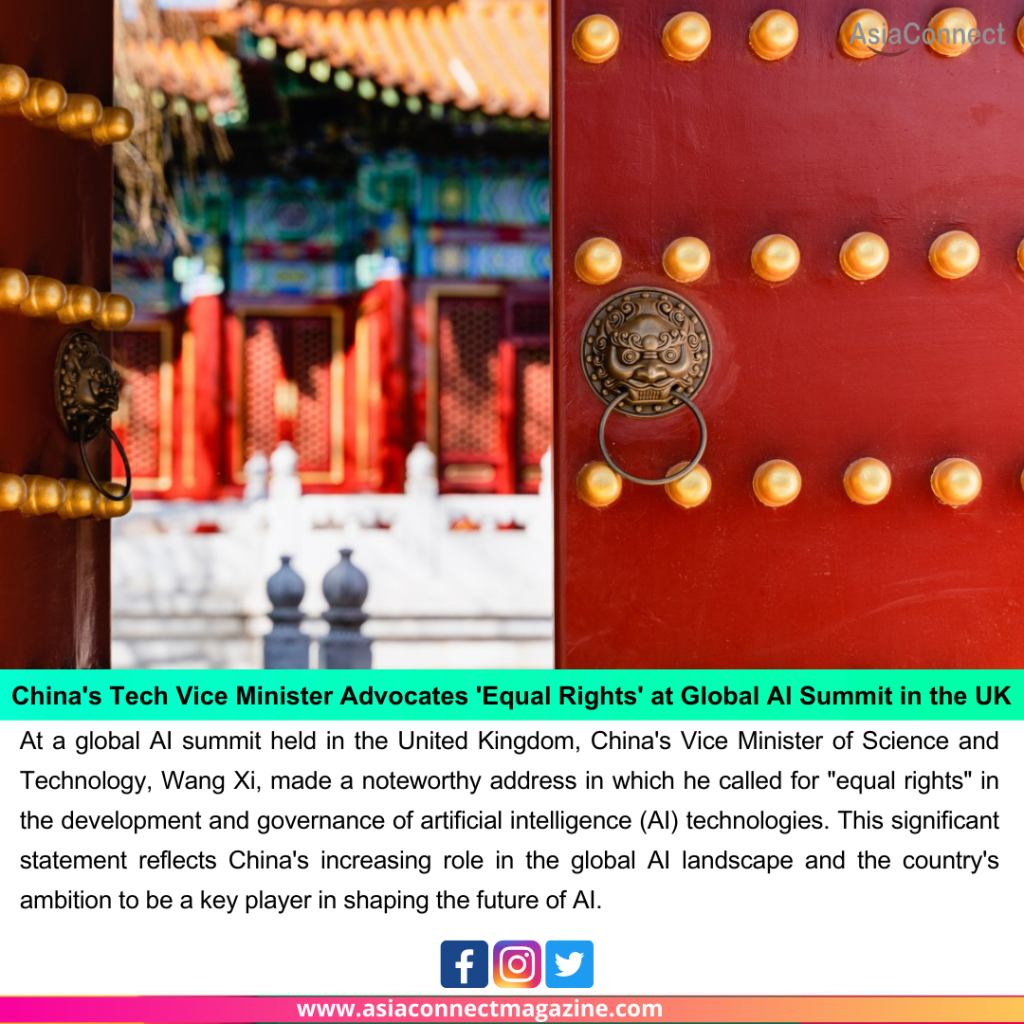
At a global AI summit held in the United Kingdom, China’s Vice Minister of Science and Technology, Wang Xi, made a noteworthy address in which he called for “equal rights” in the development and governance of artificial intelligence (AI) technologies. This significant statement reflects China’s increasing role in the global AI landscape and the country’s ambition to be a key player in shaping the future of AI.
China’s Growing Influence in AI
China has been making substantial strides in the field of artificial intelligence over the past decade. The country has rapidly emerged as a global AI powerhouse, with significant investments in research, development, and deployment of AI technologies across various sectors, including healthcare, finance, and manufacturing.
China’s tech giants, such as Tencent, Alibaba, and Baidu, have been at the forefront of AI innovation, while its government has supported AI initiatives with substantial funding and favorable policies. As a result, China has made considerable progress in AI research, development, and commercialization, leading to a strong global presence in the AI arena.
Vice Minister Wang Xi’s Call for ‘Equal Rights’
Vice Minister Wang Xi’s statement at the global AI summit held in the UK emphasizes the importance of ensuring that all nations have equal access to AI technologies and equal participation in shaping the future of AI. This call for “equal rights” in AI is particularly significant in the context of China’s expanding influence in the field.
Wang Xi highlighted the need for a collaborative approach to AI governance and regulation that takes into account the interests and concerns of all countries, irrespective of their level of AI development. In his speech, he emphasized that AI should not become a tool of hegemony or a source of global inequality, but rather a force for mutual benefit and shared progress.
Challenges in Achieving ‘Equal Rights’ in AI
While the concept of “equal rights” in AI is admirable and aligns with principles of fairness and equity, achieving this goal is not without its challenges. Several factors need to be addressed to create a more equitable global AI landscape:
- Access to Resources: AI development requires substantial resources, including talent, infrastructure, and data. Ensuring equal access to these resources is a complex task, as some countries may have inherent advantages in one or more of these areas.
- Intellectual Property and Patents: Issues related to intellectual property rights and patents can create disparities in AI access. Striking a balance between protecting innovation and promoting equitable access is a delicate challenge.
- Data Sharing and Privacy: Data is the lifeblood of AI, and access to diverse and extensive datasets is crucial for AI development. However, concerns about data privacy and security can hinder global data sharing and cooperation.
- Regulatory Frameworks: Different countries have varying regulatory frameworks for AI. Harmonizing these frameworks to ensure fairness and transparency can be a complex and time-consuming process.
- Ethical Considerations: Ethical concerns surrounding AI, including bias and discrimination, pose a significant challenge to achieving “equal rights” in AI development. These concerns need to be addressed in a manner that respects cultural and ethical diversity.
Global Collaboration and Multilateral Efforts
To work towards achieving “equal rights” in AI, international collaboration and multilateral efforts are essential. Countries must come together to establish common standards, guidelines, and principles that govern the responsible development and deployment of AI technologies.
International organizations, such as the United Nations and the World Economic Forum, are already engaged in discussions about AI governance, and these efforts can serve as important platforms for promoting collaboration and shared values.
Vice Minister Wang Xi’s call for “equal rights” in AI signifies China’s willingness to engage in these global conversations and its recognition of the need for a level playing field in the AI landscape. It is a reminder that the future of AI should be a collective endeavor that benefits all of humanity, regardless of national boundaries or levels of technological advancement.
As AI continues to shape our world, the importance of fostering cooperation and ensuring “equal rights” becomes increasingly evident. By working together, nations can harness the potential of AI while addressing the challenges it presents, ultimately leading to a more equitable and inclusive future for the technology.




